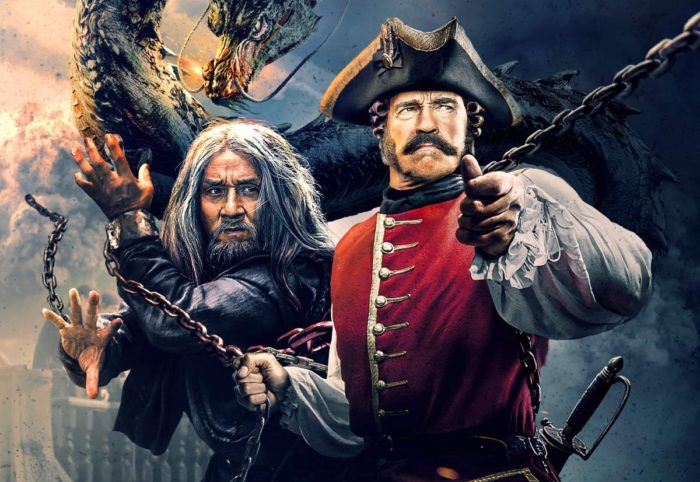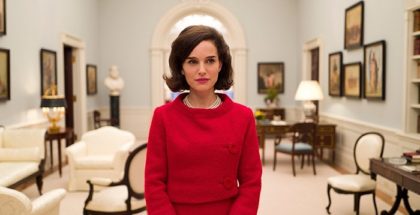VOD film review: The Iron Mask
Review Overview
Bland dialogue
4Unpredictable action
7Imaginative ideas
7Anton Bitel | On 10, Apr 2020
Director: Oleg Stepchenko
Cast: Jason Flemyng, Jackie Chan, Arnold Schwarzenegger, Yuri Kolokolnikov, Yao Xingtong, Ma Li, Charles Dance, Rutger Hauer
Certificate: 15
Watch The Iron Mask online in the UK: Apple TV (iTunes) / Prime Video (Buy/Rent) / TalkTalk TV / Virgin Movies / Rakuten TV / Google Play / Sky Store
The paradox of tea is that it is both a basic household item and an ancient commodity that has formed connections between nations across the globe. In other words, tea is an everyday beverage that comes with a strong aroma of geopolitical history. To declare Oleg Stepchenko’s The Iron Mask an imaginative chronicle of this warm drink’s trading supplies and routes in the early 18th century would be accurate, if somewhat misleading. For in a film that is full of doubles and impostors, masks and machinations, the heady flavour of tea conceals all manner of other ingredients, be they daring prison escapes, political intrigue, stormy seas, dark wizardry (or something like it), enlightenment technology, revolutionary insurrection, martial arts mayhem – and, oh yes, here even be dragons.
The difficulty of pinning down the identity of The Iron Mask can be discerned in its multiple titles – Journey to China: The Mystery of Iron Mask, The Mystery of Dragon Seal, The Dragon Seal, or its original Russian title Viy 2: Journey to China. This really is a sequel, continuing the adventures of English cartographer Jonathan Green (Jason Flemyng) from Stepchenko’s Russian 3D blockbuster Viy (2014), which was itself an extremely loose adaptation of a Nikolai Gogol novella of the same name (first published in 1835). The title used for the film’s UK release masks the film’s status as a sequel, while associating it, not inappropriately, with the sort of epic escapades found in the novels of Alexandre Dumas, who was writing at about the same time that the film is set.
Where in the first Viy film, Jonathan Green was remapping Gogol’s folkloric horror, this time, Jonathan’s travels take him beyond a monster-filled Ukraine to a tea-harvesting town in China that is being held captive by a brutal gang of extortionists with (apparent) supernatural powers. Jonathan is joined in his journey by Cheng (Yao Xingtong), the town’s exiled Princess whom Jonathan supposes to be a young man. Meanwhile, Cheng’s kung fu master father (Jackie Chan), chained up in the Tower of London by the tough warden James Hook (Arnold Schwarzenegger), helps a fellow prisoner in an iron mask – in fact Peter the Great (Yuri Kolokolnikov) – escape to take a seal to Cheng. On his voyage across the seas in a boat manned by cossacks, Peter the Great is accompanied, improbably, by Green’s well-heeled fiancée Miss Dudley (Anna Churina) – who is, along with her own disapproving father (Charles Dance), a recurring character from the first film. Once reunited at the Chinese town, all must work together to oust the gang and their witchy leader (Ma Li).
The result is a green-screened, anything-goes caper, blending action, fantasy and comedy, and pitched somewhere between Stephen Norrington’s The League of Extraordinary Gentlemen (2003), Zhang Yimou’s The Great Wall (2016) and Moon Hyun-sung’s The King’s Case Note (2017), and between Gore Verbinski’s Pirates of the Caribbean and Tsui Hark’s Detective Dee franchises. It is fast-moving. knowingly daft and not a little flat, as its set-pieces play out like levels in a video game. Part of the draw here is the chance to see Jackie Chan and (executive producer) Arnold Schwarzenegger, reunited on screen for the first time since Frank Coraci’s tonally similar Around The World in 80 Days (2014), slugging it out once again – or to catch a glimpse (and it really is little more than that) of Rutger Hauer in one of his final rôles.
Even as The Iron Mask pays mere lip service to history, or even to the basic laws of physics, it nonetheless exposes the magic of its ‘wizard’ characters as mere smoke and mirrors (aided by steampunk technology), and so becomes one of those effects-heavy, CGI-inflected works that constantly advertises and deconstructs its own artifice by making special effects and illusionism a self-conscious theme of its narrative. Even the dragon – first seen in the film’s prologue as part of an elaborate wood carving through which the camera impossibly winds, twists and turns, and then shown as a fake model designed to frighten the townsfolk, before eventually being realised in its fully-fledged (digitally rendered) form – is, in the film’s coda, reduced to the level of allegory, less a living, flying creature than a mere metaphor of community. It is also another sort of metaphor – for, spending most of the film dormant, this tea-producing creature is a literal ‘sleeping dragon’, an expression conventionally used to describe China’s suppression over several centuries (by an alliance of countries including Jonathan’s England and Peter’s Russia) before its eventual resurgence as a superpower.
The Iron Mask may have been made primarily in the English language to appeal to one world market, but it is set mostly in China to appeal to another – with all the Cossack characters serving as a bridge between these two trading blocs. So there are, in all these globe-trotting deeds of cooperative derring-do, elements of geopolitical reality alongside the flights of fancy.



















